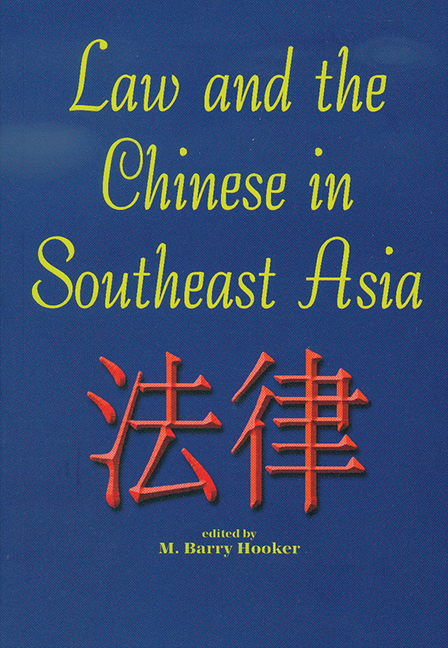Book contents
- Frontmatter
- Contents
- Preface
- The Contributors
- 1 Law and the Chinese Outside China: A Preliminary Survey of the Issues and the Literature
- 2 The Legal Position of the Ethnic Chinese in Indochina under French Rule
- 3 Law and Memory, De Jure to De Facto: Confucianization and its Implications for Family and Property in Vietnam
- 4 English Law and the Invention of Chinese Personal Law in Singapore and Malaysia
- 5 The Indonesian Chinese: “Foreign Orientals”, Netherlands Subjects, and Indonesian Citizens
- 6 Chinese Family Firms in Indonesia and the Question of “Confucian Corporatism”
- 7 China's Citizenship Law and the Chinese in Southeast Asia
- Index
4 - English Law and the Invention of Chinese Personal Law in Singapore and Malaysia
Published online by Cambridge University Press: 21 October 2015
- Frontmatter
- Contents
- Preface
- The Contributors
- 1 Law and the Chinese Outside China: A Preliminary Survey of the Issues and the Literature
- 2 The Legal Position of the Ethnic Chinese in Indochina under French Rule
- 3 Law and Memory, De Jure to De Facto: Confucianization and its Implications for Family and Property in Vietnam
- 4 English Law and the Invention of Chinese Personal Law in Singapore and Malaysia
- 5 The Indonesian Chinese: “Foreign Orientals”, Netherlands Subjects, and Indonesian Citizens
- 6 Chinese Family Firms in Indonesia and the Question of “Confucian Corporatism”
- 7 China's Citizenship Law and the Chinese in Southeast Asia
- Index
Summary
Personal law is a unique phenomenon and is found only in the ex-British possessions which had English (common) law as the general law for the population. It may be defined as rules (a) applicable only to persons of a specified race or religion (b) formulated in English law terminology (c) derived from indigenous manners or customs (d) but subject to English law standards of justice, equity, and good conscience. Well-known examples include the various African customary laws, the Anglo-Muslim laws of India, Pakistan, and Malaysia, the native laws of Sabah and Sarawak, Burmese Buddhist law, the Malay adat (customary) law and, the subject of this chapter, Chinese personal law.
Personal laws are sometimes called “hybrid” laws, and so they are in the sense that they are the offspring of quite different parents. However, they are more than just that. From the earliest days of their being, which we conventionally date from 1781 in Calcutta, they have taken on a life of their own. In some instances, for example, Burmese Buddhist law, they are a pure invention of the nineteenth century English judicial mind. By “invention”, I mean no denigration; on the contrary, this law, like all personal laws, can be seen as a true multicultural creation, the worth of which has stood the test of time. This is true also for such major systems as the Anglo-Muslim and Anglo-Hindu laws. Purists can and do criticize the complex rules developed over the past 200 years on the grounds of serious judicial error in understanding the classical texts of Islam and Hinduism. This is a perfectly legitimate complaint. However, the mistakes of 200 years ago live on and the whole corpus actually works quite well; it has a social as well as a judicial utility. The source of a personal law, whether it is by mistake or invention, does not really matter; it is the process of its growth and development which is important. The law reports contain rich material for what is now called “cross-cultural” studies but it remains under-used by historians and social scientists. One example is given in this chapter.
The Chinese personal laws of Singapore, Malaysia, and Burma have been described elsewhere. They are alive and well in 1999 in Malaysia and Singapore although their position in Burma is not known.
- Type
- Chapter
- Information
- Law and the Chinese in Southeast Asia , pp. 95 - 130Publisher: ISEAS–Yusof Ishak InstitutePrint publication year: 2002

